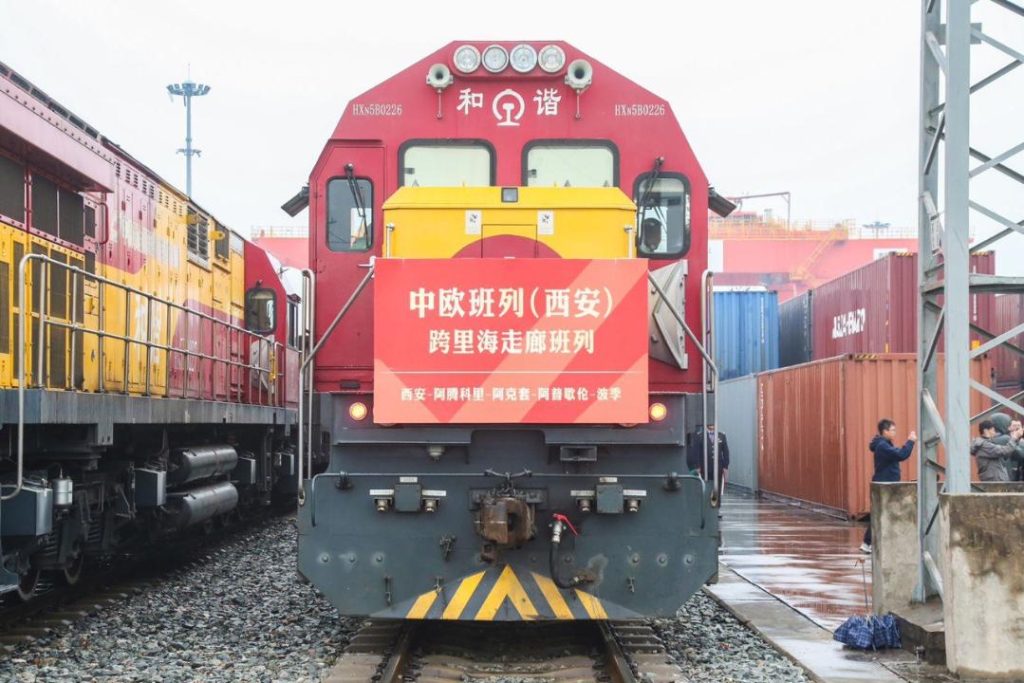
The transport potential between Kazakhstan and China is significant and continues to actively develop, strengthening economic ties and increasing trade volumes between the two countries.
Railway Connectivity:
In July 2024, Presidents of Kazakhstan and China, Kassym-Jomart Tokayev and Xi Jinping, jointly inaugurated the new “China-Europe” route via the Trans-Caspian International Transport Route (TITR). This marked the first instance of a Chinese freight train reaching a Caspian Sea port directly via railway, significantly reducing delivery times to Europe.
Automobile Corridors:
As part of the Belt and Road Initiative (BRI), Kazakhstan and China continue to develop automobile routes linking Asia and Europe. In 2023, Kazakhstan showcased its trade potential in Hong Kong, emphasizing the importance of barrier-free trade and investment cooperation. To date, 150 countries and over 32 international organizations have joined the initiative.
Trans-Caspian International Transport Route (TITR):
In November 2023, Kazakhstan and China signed agreements on TITR development, including container trains for the “China-Europe” route. These agreements were ratified by the Republic of Kazakhstan on July 1, 2024. To enhance the route’s attractiveness and competitiveness, a unified multimodal service was introduced throughout its length.
Kazakhstan plays a central role in the implementation of the Trans-Caspian International Transport Route (TITR), or the Middle Corridor. This project strengthens the country’s position as a crucial link between East and West, reinforcing its role in the Belt and Road Initiative (BRI).
The first train along the route departed on July 1, 2024, from Xi’an (Shaanxi Province, China) to Baku (Azerbaijan). Kazakhstan is not just a transit segment but also a significant logistics hub, utilizing the infrastructure of the Khorgos border crossing, its railway network, and the Port of Aktau. Trains carrying consumer goods and automotive equipment traverse Kazakhstan, ensuring stable supply chains and boosting related industries.
Advantages for Kazakhstan
1.Logistical and Economic Potential:
The route promotes the growth of Kazakhstan’s export and transit capabilities. Increased trade flows through the country generate revenue from transport services and stimulate the development of small and medium enterprises (SMEs). Delivery via this route is expected to take approximately 12 days, making it more competitive compared to alternative routes through Russia or the Southern Corridor.
2. Infrastructure Development:
Kazakhstan is modernizing its ports, railway stations, and service centers, enhancing capacity and attracting additional investments. New jobs in logistics and transportation sectors contribute to regional employment growth.
3. Geopolitical Advantage:
Amid global changes, the Trans-Caspian route has become a preferred choice for many shippers. With its stable economy and political landscape, Kazakhstan strengthens its position as a reliable partner.
The TITR route involves crossing multiple borders and transferring goods between different types of transport. However, Kazakhstan, with its experience in international transport projects, actively works to minimize transit costs. Key steps include the digitalization of logistics processes and the harmonization of customs procedures.
Future Implications for Kazakhstan
The China-Europe Trans-Caspian Express opens new prospects for deepening economic cooperation with China, the Caucasus, and Europe. For Kazakhstan, this is not only an opportunity to increase transit volumes but also a crucial step in realizing its national strategy to become the region’s largest transport hub.
This project aligns with the statements of Kazakhstan’s President Kassym-Jomart Tokayev, who has repeatedly emphasized the importance of economic diversification and integration into global supply chains. The route aligns with Kazakhstan’s long-term goals, solidifying its leadership in the Eurasian region.
The launch of the China-Europe Trans-Caspian Express stimulates SME growth, creates new economic zones, and attracts investments. Kazakhstan gains access to broader international markets, while its transport industry benefits from technological advancements and new partnerships.
Investments and Infrastructure Development
In 2023, Kazakhstan and China signed commercial contracts worth over $565 million to develop transit routes, including TITR. The two countries discussed ways to improve the efficiency of border crossings, logistics centers, and transport infrastructure along the border. Efforts are underway to modernize trade infrastructure and border control systems at the Khorgos ICBC and SEZ “Khorgos – Eastern Gate.”
Trade and Economic Cooperation:
According to Chinese customs statistics, bilateral trade between China and Kazakhstan reached a record $41 billion in 2023, an annual increase of 32%.
Kazakhstan is expanding infrastructure along the TITR, strengthening its position as a key element of the global logistics network. Kazakhstan’s Minister of Transport, Marat Karabaev, announced at a government meeting on November 26, 2024, that the country is accelerating the construction of new terminals, including one on the European segment of the route. Terminals in Poti (Georgia) and Xi’an (China) have already been launched, while a container hub is being built at the Port of Aktau in partnership with China’s Lianyungang Port. Additionally, Abu Dhabi Ports is constructing the multifunctional Sarzha terminal at the Port of Kuryk.
From January to October 2024, TITR freight volumes grew by 68% to 3.8 million tons, and container traffic increased 2.7 times from 17,300 to 46,300 TEU. Notably, the number of containers from China increased 25 times due to the opening of the Kazakhstan-China port in Xi’an.
A breakthrough agreement with Chinese authorities aims to increase the number of container trains from 400 to 3,000 annually by 2029. Kazakhstan implemented the TTS customs control system, reducing border crossing times from four hours to 30 minutes, and aims to increase route capacity to 10 million tons annually.
Kazakhstan as a Eurasian Transit Hub
Kazakhstan’s strategic geographical location, developed infrastructure, and active role in international initiatives position it as a key player in Central Asia and beyond. Major international transport projects such as the New Silk Road, TITR, and the China-Europe Railway Express pass through Kazakhstan, ensuring reliable connectivity between China, the Caucasus, Europe, and the Middle East.
China Studies Center, Astana
